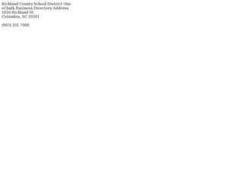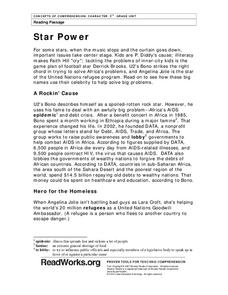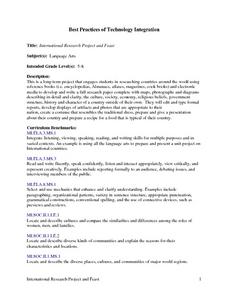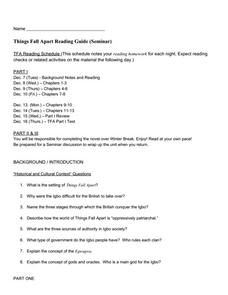Prestwick House
Brave New World
Readers of Brave New World demonstrate what they remember of events in Aldous Huxley's dystopian novel by completing a 26-clue crossword puzzle.
Polk County Public Schools
The Blame Game for the Loss at Pearl Harbor
Known as the day that will live in infamy, the attack on Pearl Harbor in 1941 was a shock to all. But why was the United States unprepared on that December morning? Study a series of primary sources in a document-based question that...
Curated OER
Art and Propaganda
Students examine the types of propaganda used throughout World War II. In groups, they view examples of different posters and artwork used to identify the human emotions the government was trying to appeal through. They develop their...
Curated OER
High Profiles
Students research and write newspaper articles about current world leaders, using a New York Times International article as a model. They research a current world leader's personal background and political history.
Curated OER
Lessons from the Holocaust
Students discover what a dictatorship is by examining the holocaust. In this government instructional activity, students discuss the laws that were enacted for Nazis to take control of Germany, and the types of laws we have put...
Curated OER
The Enemy that Never Was
Students conduct research and explain in a speech why Japanese Canadians were not a threat to Canada during the Second World War.
Curated OER
The Enemy that Never Was
Students write speeches explaining why Japanese Canadians were not a threat to Canada during World War 2. In this Japanese Canadians lesson plan, students learn about racism, and how the Japanese were targeted but not a threat during the...
Curated OER
Civilizations of the Ancient Near East
Sixth graders investigate ancient civilizations by creating a research project. In this world history activity, 6th graders investigate historic civilizations developed close to important rivers of the near East. Students...
Curated OER
TB - Lusitania Day (1916)
Students, after brainstorming all the different types of propaganda, explore, analyze and study the nature, origin and purpose of propaganda and how its aims are achieved. They assess how the sinking of the Lusitania was manipulated by...
Curated OER
Marie Antoinette and the French Revolution
Young scholars examine how the French and American revolutions influenced and emergence of free press in these countries. Students explore the link between government control of the press and the type of government. They compare and...
Curated OER
Latin America and United States Policy Today
Students compare the situation of Latin American immigrants with the situation of immigrants from other areas of the world. They use media to obtain information on topics of academic interest, personal interest, and intellectual interest.
Curated OER
Memorandum Regarding the Enlistment of Navajo Indians
Students examine the Navajo dictionary used by the U.S. military in W.W. II. They role-play Navajo messengers and Marine Corp staff. They research the Battle of Iwo Jima and confirm or discount the claim that Navajos made the victory...
Curated OER
Dictatorship
Fifth graders research world history by researching democracy. In this dictatorship instructional activity, 5th graders read the story "The Composition" and identify a list of former dictators on the Internet. Students define several key...
Curated OER
The Language of Human Rights
Did you know that there are 15.2 million refugees in the world? High schoolers will read "The Universal Declaration of Human Rights" and learn how they can get involved to lower this surprising number. To really encourage involvement,...
Curated OER
The Art of Protesting
Students view various images to examine different types of protest Americans have used throughout history, and explore ways in which protest can produce change for better or worse.
National Endowment for the Humanities
Revolution '67, Lesson 2: What Happened in July 1967? How Do We Know?
Even in a world in which dozens of participants and curious onlookers record every controversial event, the basic facts of what happened are often in dispute. Revolution '67, Lesson 2 explores 1967 Newark, New Jersey using an examination...
Read Works
Star Power
Angelina Jolie, Bono, and P. Diddy all have something in common: they use their fame to contribute to society in such a way that makes the world a better place. After reading a three-page passage on the types of causes to...
Curated OER
International Research Project and Feast
Students research countries around the world. They develop and write a research paper that includes maps, photographs, and diagrams. They describe the culture, society, economy, religious beliefs, government structure, and history of...
Curated OER
Government and Community Resources
Adult learners, with the assistance of flash/picture cards, explore a variety of United States holidays and social customs: Labor Day, Halloween, Thanksgiving, Hanukkah, Christmas, and more. In addition, they draw pictures illustrating...
Curated OER
Things Fall Apart Reading Guide
Chinua Achebe’s Things Fall Apart can present challenges even for experienced readers. Here’s a schedule and corresponding guide that will help readers focus on and record important events. The packet includes fact-based, interpretative,...
Curated OER
Primary vs. Secondary Sources Notes
What’s the difference between primary and secondary source materials? Here’s a handout, designed as a reference for learners, that does a good job of distinguishing between primary and secondary source materials and providing examples of...
Curated OER
Brazilian Animals
Students research the animals of Brazil. In this animal science lesson plan, students locate Brazil on a map and discuss the types of animals that can live in its tropical climate. They research a Brazilian Carnaval and see the roll the...
Curated OER
Where in the World is Tacky the Penguin?
First graders complete activities related to they story they are reading in class. Through art and measurement activities, 1st graders relate a story from the "Tacky the Penguin Series" to everyday objects and ideas they encounter.
Curated OER
Magnets in a Bag
Fifth graders compare and contrast the patterns that they create using iron fillings and different types of magnets.























